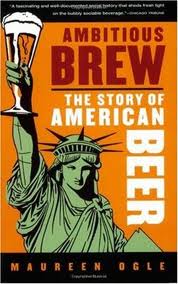 It seems apt that a book delving into the history of beer in the United States would be titled Ambitious Brew. A few years ago historian Maureen Ogle penned what is likely the most complete historical examination of brewing in the U.S. I picked up a copy of it while in San Fransisco in the spring and slowly plugged my way through it over the summer. While I know it is not related to beer on the Canadian prairies, it seemed worthwhile to offer my take on the book.
It seems apt that a book delving into the history of beer in the United States would be titled Ambitious Brew. A few years ago historian Maureen Ogle penned what is likely the most complete historical examination of brewing in the U.S. I picked up a copy of it while in San Fransisco in the spring and slowly plugged my way through it over the summer. While I know it is not related to beer on the Canadian prairies, it seemed worthwhile to offer my take on the book.
My first impression is that you can tell this was written by a capital-h Historian. It is meticulously researched, but Ogle weaves the facts into a compelling storyline. Centring it around the larger-than-life personalities of Aldolphus Busch, Frederick Pabst, the Uihlein brothers, and in later chapters Fritz Maytag, Jack McAuliffe and Ken Grossman, she gives the story a strong human angle. It is more about the determined, ambitious men than the beer they brewed.
I appreciated learning the story of the birth and growth of the big American brewers, along with some side stories of players dominant for only a short period. She contextualizes their stories well by drawing a picture of the cities and towns of the period. It is a complete book in many respects.
The story may be a good read, but at times I felt like the passion for beer was lacking. Ogle is not connected to the beer industry in any way and knew little about beer before she began the book. And I think it shows. She valiantly attempts to spotlight the passion of the men she writes about, but her own connection mars the effort. At times I felt you could replace the word “beer” with “widgets” or “cars” and the story wouldn’t change. Determined, strong-willed entrepreneur embodying the American spirit of perseverance and ingenuity captures the imagination of the public and makes a profit along the way.
This is the first of two significant shortcomings in the book. It is a mainstream history, meaning it is a history of “big men”. The economic and political context of their actions is downplayed. And the experience of the people who worked for them, and the men and women who drank their beer is lost entirely. Thus it reads like a good biograph, but much else is lost. I think of Booze by Craig Heron, in comparison – which is a stunningly thorough social history of alcohol in Canada. In Booze, when not numbed by his rigid academic writing style, you get a feel of the lives of Canada’s working men and women and the role of alcohol in shaping the country. The two books are a good contrast. Now if only someone could re-write Booze to make it more readable.
The second shortcoming is, I would guess, related. Ogle comes across far too often as an apologist for the big, corporate brewers. Not just in the early years, but even into the late 20th century. She adopts the stance that for them to sell so much beer, it must be deserving of such popularity. Too often she extols their fine brewing traditions and high quality product, which may or may not have been true in the 19th century, but is of questionable validity today. She does admire the spunk of the craft brewing upstarts, but paints them as a continuation of the ambition and pride of the early Buschs, Anheusers, Pabsts and so on.
It may be a fair point that the Maytags and Grossmans and Kochs represent what the older men did 100 years earlier. But it doesn’t work for me. The context is quite different. The Buschs and others were building an industry from scratch, with no behemoths taking up all the oxygen. The modern craft brewers have to fight for every inch of space they can find because the bloated corporate monsters play hard ball not just with each other, but with any potential threat to their profit margin. So while it makes for a tighter plotline, I respectfully disagree with Ogle that there is an unbroken lineage of determined, ambitious brewers. While they may share characteristics, the economic environment couldn’t be any more different. Which is why a little social history might have done the book well.
However, for a fan of beer it is a pleasant summer read. I enjoyed myself and even learned a few things. I can think of worse ways to wile away a few hours, especially if there is a pint in your hand as you read.


Leave a Reply